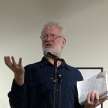
HER HANDS #2
Chapter 1, Scenes 4-6
The nun and the teenage girl wove their way through their responsibilities the remainder of the day. Sister Joanna had Sarah take the lead with washing the men, changing their bandages, administering medications. At times she made a simple suggestion such as how to best relieve swelling with warm wet cloths, and how to avoid contact with a suppurating wound. At first Sarah was too self-conscious, with the nun present, to lay her hands on the men’s injuries, but with the fourth soldier she let her hands pause at the cauterized stump end of a young man’s arm. The man had been watching Sarah as she dressed his wound and shut his eyes when she lingered. Sarah felt him relax, she felt herself relax into her efforts. When she completed the dressing, the soldier whispered, “Merci.”
As they withdrew from the amputee’s cot, Sister Joanna touched Sarah’s sleeve, leaned close to her ear and said, “You have a gift. Please don’t be reluctant to share it.” Sarah knew intuitively what the nun meant. She nodded.
The two women continued, the afternoon was timeless because they carried each other in a shared light amidst the pain, the ruin, the filth. Sister Joanna made no issue of emptying as many bedpans as Sarah. In the midafternoon they separated to sit beside the men who were suffering most notably, to read some Balzac to one, recite a bit of rosary with another, or to sit quietly with a hand resting on the forearm of another man lost in his delirium. Sarah was at peace and her peace spread like a faint ripple across a pond to the destroyed minds and bodies surrounding her. Sister Joanna was at peace as well and the two women brought solace to the nearly three dozen men crowded into the hospital’s converted meeting hall. On occasion the nun would look across the room to Sarah and observed the relief the young woman was dispensing.
Before it was time to serve the men supper, as the autumn’s late afternoon light slanted through the tall windows and reached into the hall, Sister Joanna sat with Sarah on a bench against the southern wall and rested in silence. The nun said softly, “Do you have family in the war.”
Sarah, “A cousin. My brothers are too young, my father too old.”
“A loved one, someone special, fighting?”
Sarah would have blushed in other circumstances but these were frank times, when questions needed to be genuine as did the answers. “No sister, I do not.”
“You are fortunate.”
Sarah, not boldly, “I’m not certain of that.”
The two women watched dust motes roam in the shaft of light before them. The nun nodded, “Of course. You are correct, there is no certain fortune in times like these. Nor in any time if we are to be honest. Only in Jesus’ love can we believe in good fortune.”
Sarah heated, flushed, “Yes.”
Sister Joanna asked, “Do you feel you are doing the Lord’s work here?”
Sarah shut her eyes, her eyelids translucent while images of raw, festering wounds roiled darkly in her recessed memory. She answered, almost a whisper, “I don’t know, sister.”
Also in a whisper, the nun said, “You are, Sarah. You touch men’s pain and remove it, if only slightly. That can only be the hand of God.”
The girl did not want to hear what the woman said; it was not right to think of God with all this misery. She felt a warm hand on her shoulder, heard, “Don’t worry.” Sarah opened her eyes to see Sister Joanna silently walking in the direction of the kitchen.
***
Sarah did not sleep well that night. The taut canvas cot did not receive her, the thin wool blanket scratched her to torment, the goose feather pillow engulfed her face no matter which way she turned, her cotton nightgown ensnared her legs so that every effort she made to relieve her discomfort only drove her into greater unease to the point that she was on the verge of frenzy in the mad hours after midnight.
She had worked no harder than she had on any other day. After the evening meal she had taken her usual walk through the village to the stream that bounded the fields of grain just harvested. She was alone, as she preferred. As much as she enjoyed Elise and Cecile, this time was important to be spent without company. Although if you were to ask her, she would disagree, saying she was not really alone; the day’s fevered memories accompanied her. She brought them with her to the place she had chosen unintentionally her first week at the hospital, where she could stop and rest; a bend in the stream that ran west to east with a small stretch of sand no more than a meter wide at summer depth, a couple meters long; a flat rock up a slight embankment long and wide enough to sit or lay upon, facing south, shaded by a sprawling elm. The water was shallow, running over and around the field stones, creating the music that always brought her a smile, and perhaps a recognition. She thought it was the music that had brought her to this spot, but no, it was a stunning quality of evening light across the then un-harvested field of rye throwing off a honey tinted thrum. She had gasped and sat on the stone that day, wanting no more than to take in the majesty spread before her.
Over the weeks she explored other paths beyond the village, other destinations along the stream but soon found herself returning exclusively to this small stretch. Here there were no boys splashing about, as they did at a deeper pool upstream after a day in the foundry or fields, still too young to be in uniform; nor farm animals watering where paths led to less steep stream banks; nor where the stream widened further along, with village women pounding their laundry against a slew of granite slabs. This place where Sarah rested was apart from the village’s toil and effort, and seemingly the world’s as well,
Sarah would come to think this shaded respite was meant for her, but what she would feel more deeply was this place was part of her as much as she was a part of this small point that expanded in every direction, to every conceivable horizon. She did not have these words, however. Instead she listened more and more closely to the soft rumblings and delicate splashes of the stream, to the late summer riot of the cicadas, to the mourning doves’ plaintive calls, to the rhythmic clacking of the horse drawn threshers in near and distant fields; listened until the first chill of nightfall would signal her to leave, with the day’s grim agony disassembled and cast like thistle down, airborne, to some thing or some place that could carry and bear the seed, away.
It felt something like that although Sarah did not have these metaphoric words, only lightness, passing back through the village to the hospital dormitory. No violent memories swarmed her upon her return despite her immediate familiarity with the stench and moans she re-encountered. Exhausted, she would read a bit by lamplight, or chat with the other young women in nearby cots about small matters because that was how they managed in those early weeks of the war.
But not this night. Sarah’s walk to the stream was much quicker than usual, she did not stroll as usual. She noted the light was nearly weak, the sun having already set. The mid-October air chilled her, nipped at her, annoyed her. She strode harder, she felt the urgent need to get to the place that was meant for her and, if she had the words, was truly part of her. She envisioned her point on the stream – she had not done that before – and the thought angered her. Without yet arriving she knew the field across the stream would be ugly stubble without sunlight to give the stubble the opportunity to glint golden; she knew the stone would be cold and hard; she knew the water would be too cold to dip her bare feet; she knew she would not roll her stockings down; she knew the sounds of the stream would not please her. She knew all this, in some way, beneath her general irritation.
And so it was. Sarah sat briefly on the cold rock, bounded up, paced the stretch of sand; three, four, ten lengths then stopped. She did not hear the water, she did not see the field across the stream. She only heard the scream inside her, “why?” again and again, an echo then full throated so that the question pounded the inside of her skull. “Why, God?” This time she didn’t scream, she begged. Sarah felt her chest heaving, saw the stream at her feet. Knowing it would be bitter cold, she wanted to plunge in completely. She walked into the water, into a small eddy, a rock sheltered pool. She had not taken her stockings off, nor her shoes – she had no thought to do that. The frigid stream grabbed her ankles and her blood roared through her in response, contracting her lungs. She gasped – foul air flew from her. In that escaping gasp she tasted the day, the days, the meals, the suppurating flesh, the cordite scorched hair in that moment. She stepped further, shin deep; further, nearly knee deep. Her body rooted as she stood she would soon tremble violently, but before she did she turned to face upstream, to face directly what was coming at her. She looked at the stream, the last evening light barely reflected in the current, barely visible but her eyes adjusted and took in the liquid gloaming. Sarah whispered, “Why, God?” Her body then convulsed violently. Some might say it had reacted to the chill that had reached her core, other’s might say it was God’s answer to Sarah for being so impudent as to question His design. She had to speak her heart. There would be time perhaps later to consider her question as the devil’s mischief, but now she had to allow her heart.
The faint light barely a whisper, Sarah knew this moment was finished. She walked the few steps to shore, heard the crunch of her shoes on the sand, the sound of her returning. She sat on the flat rock and felt its cold punctuate her skirt. She removed her shoes and stockings with only the thought that it was what she needed to do.
She then walked the path back to the village, walked the streets of the village back to the hospital dormitory. She felt every sharp-edged rock, every spiked twig, every cobblestone and kerbstone her feet alighted upon. Most of her steps were painful and all of her steps were blind. Each instance of pain she felt without thinking was a tiny fraction of what the men in that hospital suffered, what men in hospitals across the warring countries suffered, and men not yet retrieved from the battlefields suffered, and men not yet in the field. Her suffering was as nothing to all the pain now and to come. So it was. Her barefoot journey through the village was as nothing.
Some would say she understood Jesus in that walk. Sarah did not carry that understanding beyond her knowledge that she could not comprehend the enormity of the pain she would witness. She stopped in the shadow of a gabled roof overhang and heard the faint rumble of large guns shelling men in the night. The sound was new to her; the war had moved, it had changed. Often, after that night, she would hear distant shelling even when no such sound had reached her, which lasted for as long as men with destroyed bodies and minds were being brought to her.
In her dormitory room she didn’t speak to anyone. Elise and Cecile were surprised by Sarah’s solemnity and then her bleeding feet. Sarah lay on her cot, eyes open. They let their friend be, but each to herself knew they would attend to Sarah in the morning. Sarah lay still and thought about making the rounds with Sister Joanna in the morning.
***
The dawn crept into the dormitory room. In the pale light Sarah lie still, the thin wool blanket pulled up to her chin against the October chill and watched the other young women stir and rise slowly. Their movements graced the moment. As they shed their nightdress and gently pulled on their work clothes; blouses, skirts, stockings, Sarah felt a surge through her and rest in her heart. Without question, she loved these women, each of them. With that she pulled away the blanket and its cocooning warmth, threw her legs over the edge of the cot and her bare feet landed on the cold oak floor. She joined her fellow nursing attendants in their communal grace, the rhythm of the commencing day.
As usual she seated herself with Cecile and Elise at one of the long tables in the dining hall, both of whom had started eating their steaming bowls of barley mush. They both looked up as Sarah took her place on the bench
“How are you?” asked Cecile.
Cecile’s question caught Sarah by surprise as it was not how they usually greeted each other, and certainly not with that tone of concern. Sarah had been so taken with the grace she was feeling that morning that she had not reflected on the anguish she had felt the night before. Even as she had pulled her coarse wool stockings over her nicked feet, and felt the stabs of pain from the several small wounds, she didn’t consider what had happened to cause them. But now, the tone of Cecile’s voice and the implication of extraordinary concern in her question jolted Sarah from the serenity of the morning.
“I’m fine.” She hadn’t lied, she had no other words for an answer. Yet she wanted to treat her friend’s question fairly. She searched to understand Cecile’s concern.
Elise spoke, “Last evening when you returned…”
Cecile joined, “It was late. You didn’t speak…”
Elise, “You stared at the ceiling. Nothing more, just stared…”
Cecile, “What happened? Did anything happen?”
Both of the young women were now speaking in hurried whispers. Sarah had not begun to eat. She looked from one woman to the other and back again, trying to grasp the prior evening. She convulsively recollected standing in the stream, her barefoot return, the devouring thoughts as she lay in her cot; the incessant “why” that kept repeating in a dull void. She had felt uneasy, at a loss, agitated.
She answered, “Nothing. Nothing happened.” She looked sincerely at her two friends, “I can’t explain what happened. I’m not sure. I don’t know what to say.”
The two women nodded. Cecile asked, “And today? How are you today?”
With the shadowed memory of her turmoil, she wasn’t sure, “I’m fine…I think.”
It struck Sarah that she needed to eat, rounds would begin soon, her friends needed to finish their breakfast as well. She smiled and let the warmth she felt for Cecile and Elise fill her smile when she said, “I’m fine. I really am.” In another time she might have added that she loved them because that love filled her as she spooned the hot mush to her growling stomach.
A few minutes later, the nuns to whom the girls were assigned appeared at the dining hall entrance. No routine had been set, so nuns and nursing attendants awkwardly parsed the situation. The fact that the several nuns remained at the entrance suggested that the young women were to finish their meals and report to their mentors. The moment seemed to stretch to eternity. Sarah, Elise and Cecile each placed their spoons in their bowls, their breakfasts unfinished, and together rose from the table. The four other young women who had been assigned mentors rose as well. As a group they brought their dishes to the washstand. Sarah took a last bite and swallowed the cider that remained in her mug before leaving her dishes and joining Sister Joanna, who stepped forward as she approached, “Good morning, Sarah.”
“Good morning, Sister.”
“Did you sleep well last night?”
“I did, Sister.” Sarah looked over at the nun as the two walked the corridor to the hall that held the wounded, the morning lightening the tall windows they passed.
“That’s good. There has been heavy fighting, we are expecting many men to arrive before the day is through. We will need to prepare many of the men who are with us now to leave.”
Sarah remembered the sounds of distant shelling she had heard last evening, the beginning of what would later be known as the First Battle of Ypres, and the entire evening returned to her in a moment, ending with her silent scream, “Why, God?”. She didn’t falter, she didn’t break stride with that of the nun beside her.
About the Creator
Ed Burke
Poet, novelist, lawyer, father, friend. "Her Hands" is a novel in progress about Sarah, a transcendant healer serving during World War I. I will share the scenes taking form, consistently, until her saga is told. Ea/ Ed Burke on facebook






Comments
There are no comments for this story
Be the first to respond and start the conversation.